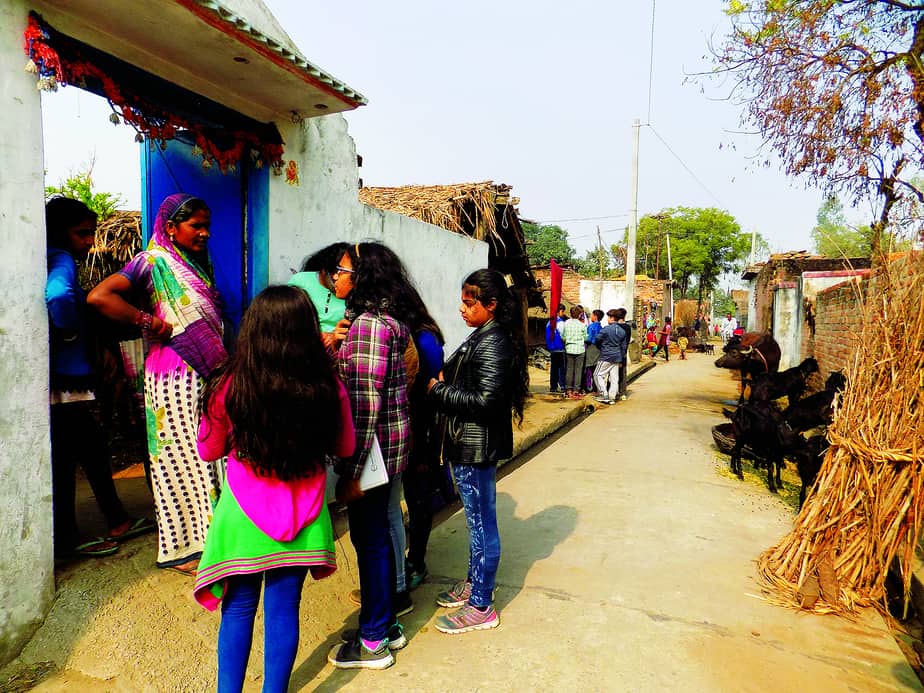
What takes a bunch of 60-odd student campers of Tagore International School, Vasant Vihar, to Dudhwa Tiger Reserve in Uttar Pradesh every year? It’s to bond with Mother Nature and explore wilderness; as also to make a hands-on contribution for conservation of our environment.
They camp out in the open in a mango-litchi grove amidst fields of mustard and sugarcane, under the blue sky that spans Kishanpur Forest Range of Dudhwa Tiger Reserve; this is the last surviving remnant of the fast vanishing Himalayan Terai ecosystem.
Lucknow-based environment education society Karavan pitches tents from November to March every year to organise its National Environment Science Camp (NEVSC). Spartan jungle tents with mattresses on the floor are provided to the children while more comfortable tents (with ‘attached’ bathrooms) are arranged for teachers. A lavish vegetarian spread comes out of a kitchen run by Tharu tribals, who hail from a settlement 50 km away on the Indo-Nepal Border.
“NEVS Camp has become an annual event not just for us but also for several schools located in almost all parts of India. The first edition of this Camp was held in 2006. Since then thousands of student campers from three score schools have joined us in this movement for conservation”, says Vikrant Nath, Camp Coordinator.
This year’s theme being ‘Forest and Man’, the kids go on a jungle safari in the morning. While it is easy to sight spotted deer, swamp deer and wild boar, tigers can be so very elusive. But tigers reveal their majestic presence with imprints on dirt tracks and scratches on trees. In a placid water body, campers spot a variety of birds and crocodiles sunning themselves.
In the evening, they are asked to form groups and present skits about how humans can conserve Nature. A girl suggested putting dustbins in the forest. This makes the other students laugh, and a boy makes a wisecrack: “Why not toilets for tigers?” Nobody takes offence, for it is all part of the high spirits that fresh air and the thrill of wildlife sightings brings.
Camp leader Deepti says about the kids, “This batch has been one of the best this season. The students are buzzing with positive energy and yet are a disciplined lot. They participate with enthusiasm in all the activities, which are as exciting for them as living in tents.”
For their visit to a rural settlement, the children memorise a slogan ‘Saanp humara baap hai, isko marna abhishap hai…….’ and chant it enthusiastically while marching through the village lanes. They stop at various doors and ask the women and old men present whether they know that snakes keep the rat population under control, and should not be killed. Most villagers said they are well aware of this fact, and try to trap the snakes and release them in the nearly fields. The exercise gives students a feel of a real village, and the confidence to strike up a rapport with complete strangers about matters that concern all of humanity.
Back in the camp for a storytelling session, they are startled by the sudden appearance of a man with wild hair, wearing a long red kurta. He is ‘Mr Po Ching’, and his scary look is meant to project him as the villain of the forest, who kills animals for their hide, bones or meat. The children scream in surprise, enjoying the thrill of the unexpected. They are also told the real-life recent incident of the killing of a leopard in a nearby village, when it entered a hut. Though villagers say one of them shot it dead, a policeman took credit for this cruel and illegal act, and was promptly suspended from service. The proper procedure is to wait for a forest team to arrive, tranquilise and trap the unfortunate animal, who should be released back in the wild.
Early morning, the campers go for a jog on the village roads and then enjoy a game of tug-of-war and rope-climbing. And then it’s time to pack up and leave, hopefully having learnt lessons of a lifetime about conserving natural resources, protecting forests and loving wildlife.
Back in school, the students told their friends in Class IV all about their experience. Next year it will be their turn. Teacher-coordinator Abha Ratra says, “They all wish they could go back to the camp and spend more time with the Karavan team. It was a fun-filled, action-packed experience.”
Delhi hosted what organisers describe as the world’s first player auction in golf, launching ‘72…
An elderly woman recalls how her six-year-old granddaughter lay bleeding after a speeding car hit…
Municipal Corporation of Delhi plans a unified policy enabling RWAs to adopt and maintain parks…
A 17-year-old boy allegedly died by suicide after jumping before a moving train at Uttam…
Delhi High Court grants bail to 26-year-old Thar driver accused of mowing down two in…
Two Rohini men arrested for fatally stabbing one person and injuring another during a robbery…